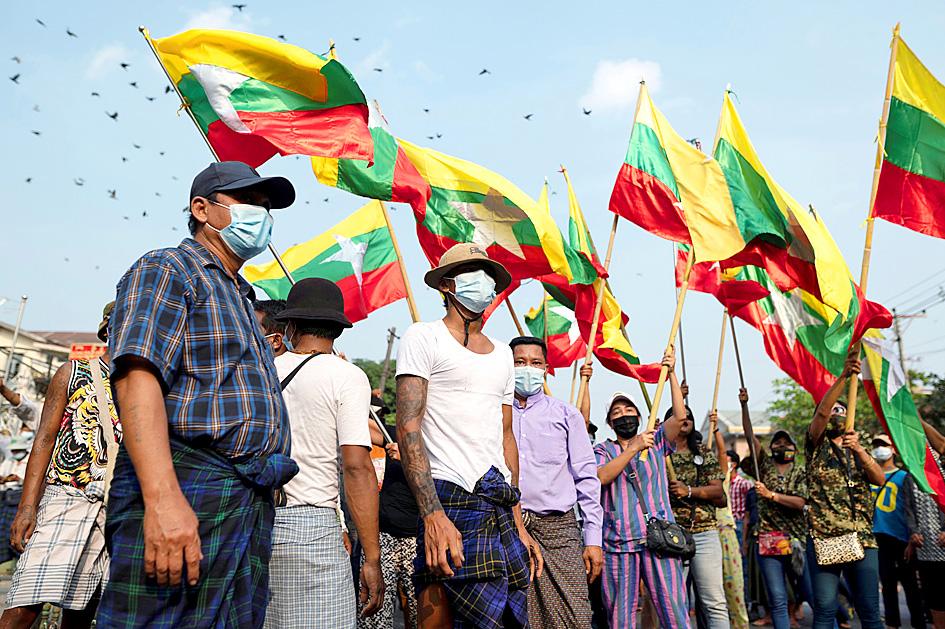Myanmar’s Union Election Commission rejected allegations by the military that fraud played a significant role in determining the outcome of elections in November last year, which delivered a landslide victory to the ruling National League for Democracy, while embassies and other global bodies yesterday urged calm.
The decision, announced on Thursday, came amid heightened tensions after the military, which had ruled Myanmar for five decades until 2015, refused to rule out the possibility of a coup if its complaints were ignored.
Aung San Suu Kyi’s National League for Democracy captured 396 out of 476 seats in the Nov. 8 polls, allowing it to form the government for another five years.

Photo: Reuters
The military-backed Union Solidarity and Development Party won only 33 seats.
The military has been calling on the government and the commission to review the results.
It said that it has found 8.6 million irregularities in voter lists in 314 townships that could have let voters cast multiple ballots or commit other “voting malpractice,” but the commission said there was no evidence to support the claims.
On Tuesday, a military spokesperson declined to rule out a coup, saying that the military would continue to file complaints about alleged irregularities in line with laws and the Burmese constitution.
The rhetoric prompted calls for calm yesterday from the international community.
More than a dozen embassies, including the US and EU delegation, urged Myanmar to “adhere to democratic norms,” joining the UN in a chorus of international concern about a possible coup.
The US embassy — along with 16 countries, including former colonial power Britain and the EU delegation — released a statement urging the military to “adhere to democratic norms.”
“We look forward to the peaceful convening of the parliament on February 1 and the election of the president and speakers,” the statement said.
We “oppose any attempt to alter the outcome of the elections or impede Myanmar’s democratic transition,” it said.
UN Secretary General Antonio Guterres also raised “great concern” over the developments, said his spokesman, Stephane Dujarric.
“He urges all actors to desist from any form of incitement or provocation, demonstrate leadership, and to adhere to democratic norms and respecting the outcome of the” election,” Dujarric said in a statement.

INVESTIGATION: The case is the latest instance of a DPP figure being implicated in an espionage network accused of allegedly leaking information to Chinese intelligence Democratic Progressive Party (DPP) member Ho Jen-chieh (何仁傑) was detained and held incommunicado yesterday on suspicion of spying for China during his tenure as assistant to then-minister of foreign affairs Joseph Wu (吳釗燮). The Taipei District Prosecutors’ Office said Ho was implicated during its investigation into alleged spying activities by former Presidential Office consultant Wu Shang-yu (吳尚雨). Prosecutors said there is reason to believe Ho breached the National Security Act (國家安全法) by leaking classified Ministry of Foreign Affairs information to Chinese intelligence. Following interrogation, prosecutors petitioned the Taipei District Court to detain Ho, citing concerns over potential collusion or tampering of evidence. The

Seventy percent of middle and elementary schools now conduct English classes entirely in English, the Ministry of Education said, as it encourages schools nationwide to adopt this practice Minister of Education (MOE) Cheng Ying-yao (鄭英耀) is scheduled to present a report on the government’s bilingual education policy to the Legislative Yuan’s Education and Culture Committee today. The report would outline strategies aimed at expanding access to education, reducing regional disparities and improving talent cultivation. Implementation of bilingual education policies has varied across local governments, occasionally drawing public criticism. For example, some schools have required teachers of non-English subjects to pass English proficiency

NEGOTIATIONS: The US response to the countermeasures and plans Taiwan presented has been positive, including boosting procurement and investment, the president said Taiwan is included in the first group for trade negotiations with the US, President William Lai (賴清德) said yesterday, as he seeks to shield Taiwanese exporters from a 32 percent tariff. In Washington, US Trade Representative Jamieson Greer said in an interview on Fox News on Thursday that he would speak to his Taiwanese and Israeli counterparts yesterday about tariffs after holding a long discussion with the Vietnamese earlier. US President Donald Trump on Wednesday postponed punishing levies on multiple trade partners, including Taiwan, for three months after trillions of US dollars were wiped off global markets. He has maintained a 10 percent

TRADE: The premier pledged safeguards on ‘Made in Taiwan’ labeling, anti-dumping measures and stricter export controls to strengthen its position in trade talks Products labeled “made in Taiwan” must be genuinely made in Taiwan, Premier Cho Jung-tai (卓榮泰) said yesterday, vowing to enforce strict safeguards against “origin laundering” and initiate anti-dumping investigations to prevent China dumping its products in Taiwan. Cho made the remarks in a discussion session with representatives from industries in Kaohsiung. In response to the US government’s recent announcement of “reciprocal” tariffs on its trading partners, President William Lai (賴清德) and Cho last week began a series of consultations with industry leaders nationwide to gather feedback and address concerns. Taiwanese and US officials held a videoconference on Friday evening to discuss the